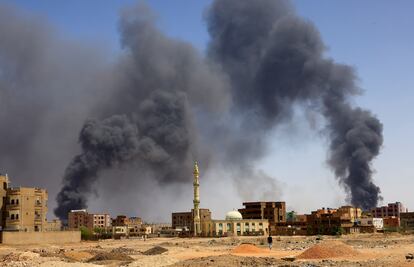Sudan’s death toll rises as warring sides continue talks
The latest figures state there have been 604 dead and more than 5,100 people wounded since the conflict started on April 15

The death toll from the ongoing clashes in Sudan has risen to 604 people, including civilians, the U.N. health agency said on Tuesday. The new figures come as representatives of the warring parties are holding talks in Saudi Arabia.
More than 5,100 people were also wounded in connection with the fighting, World Health Organization spokesperson Tarik Jasarevic told reporters. On Monday, the Sudanese Doctors’ Syndicate, which tracks only civilian casualties, said that the fatalities had reached 487.
The conflict started on April 15, after months of escalating tensions between the military, led by Gen. Abdel-Fattah Burhan, and a rival paramilitary group called the Rapid Support Forces, or RSF, commanded by Gen. Mohamed Hamdan Dagalo.
The fighting has turned urban areas into battlefields and displaced nearly 700,000 people on top of the 3.7 million who had already been internally displaced within the country before the conflict began, according to the U.N. migration agency.
On Monday, the Saudi Foreign Ministry said that talks between delegations of both warring sides were expected to continue for a few more days in the coastal city of Jeddah.
U.N. humanitarian chief Martin Griffiths proposed “a declaration of commitments” to representatives of the rival Sudanese forces to guarantee the safe passage of humanitarian aid, U.N. deputy spokesman Farhan Haq told reporters at U.N. headquarters Tuesday.
He said Griffiths made the proposal in Jeddah and “is encouraged” that there were consultations on the declaration, “so that was a step forward.”
The talks are part of a diplomatic initiative proposed by the kingdom and the United States in hopes of ending the fighting. Meanwhile, Burhan accused the RSF of using residential neighborhoods as their military bases and civilians as human shields.
In an interview late Monday with an Egyptian TV channel, Al-Qahira Al-Akhbariya, he insisted they must withdraw all their troops from the capital, Khartoum, before any truce agreement can be reached.
“If this is not achieved, there will be no point in going to Saudi Arabia, or engaging in any negotiations,” he said. “We won’t go ahead with any initiative that does not bring back normalcy and ensure the safety of our citizens.”
The RSF has not responded to Burhan’s statement.
Also on Tuesday, the U.N. special envoy for the Horn of Africa said the conflict is “profoundly” affecting Sudan’s relations with neighboring South Sudan.
Hanna Serwaa Tetteh told the U.N. Security Council that the unstable situation has “the potential for more than 200,000 South Sudanese refugees hosted by the Sudan returning home prematurely to a country where two-thirds of the population already needs humanitarian assistance.”
South Sudan is facing violent clashes and increasing disillusionment and frustration as it struggles to implement the most challenging provisions of a fragile 2018 power-sharing agreement, according to the U.N.
Before the conflict in Sudan erupted, Tetteh said, relations between Sudan and South Sudan were stable and there were regular meetings between officials of both countries, including at the highest level.
But she said “the conflict in the Sudan is putting the incremental progress achieved by the two countries in addressing their outstanding bilateral issues in jeopardy.”
Sign up for our weekly newsletter to get more English-language news coverage from EL PAÍS USA Edition
Tu suscripción se está usando en otro dispositivo
¿Quieres añadir otro usuario a tu suscripción?
Si continúas leyendo en este dispositivo, no se podrá leer en el otro.
FlechaTu suscripción se está usando en otro dispositivo y solo puedes acceder a EL PAÍS desde un dispositivo a la vez.
Si quieres compartir tu cuenta, cambia tu suscripción a la modalidad Premium, así podrás añadir otro usuario. Cada uno accederá con su propia cuenta de email, lo que os permitirá personalizar vuestra experiencia en EL PAÍS.
¿Tienes una suscripción de empresa? Accede aquí para contratar más cuentas.
En el caso de no saber quién está usando tu cuenta, te recomendamos cambiar tu contraseña aquí.
Si decides continuar compartiendo tu cuenta, este mensaje se mostrará en tu dispositivo y en el de la otra persona que está usando tu cuenta de forma indefinida, afectando a tu experiencia de lectura. Puedes consultar aquí los términos y condiciones de la suscripción digital.








































